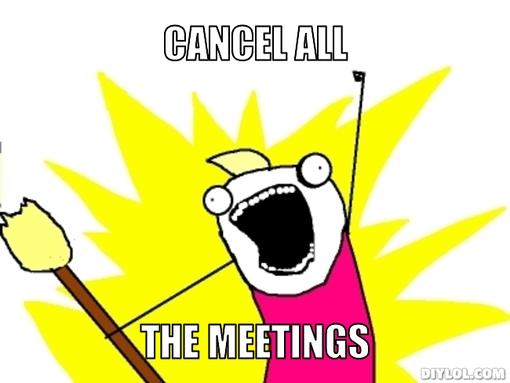We’re going to spend a few minutes talking about the cancelled meetings culture. What is that? Well, it’s a term I completely made up about three hours ago. No one has really ever used the phrase ‘cancelled meetings culture’ in the history of world business, to the best of my knowledge. But don’t worry. I’m going to explain what it means, and keep it short! Ready? Set? Let’s roll.
My Personal Cancelled Meetings Culture Anecdote
I’ll use some marketing consultant advice here and open with a story. If you read this blog even once or twice a month, you probably know I got fired from my last gig. That was seven months ago and I don’t think about it very much anymore, but I spent a solid month or two turning over everything about that gig in my head. Most of the problems related to job role, IMHO, but some came back to this idea of the Cancelled Meetings Culture.
[Tweet “Your boss cares about things, and claims to care about things. Which is which, though?”]
Now let me try to define that. Start here: at every job, there’s stuff people actually care about (usually money) and stuff they have to pretend to care about (usually everything else). This got more pronounced with digital tools. Many companies still make money in traditional ways, but they need to pretend to care about digital because it seems pretty pervasive. The typical outcome? Your digital strategy sucks.
The Cancelled Meetings Culture is at the intersection of “I care about this, but I don’t care about this.” My boss at that last gig was a traditional publishing person. I was “the digital person.” Within about 3-4 days, I knew she could give two shits about my job. In many ways, it made no sense that I reported to her. (Some dude based in Seattle had “digital business ownership” and probably would have been a better fit.)
In the first six months I worked there, I had 11-15 meetings set up with my boss to talk through ideas and strategy … and all of them? Cancelled. We met now and again, sure. But it was The Cancelled Meetings Culture, writ large. This shit matters. I pretend to care about this other shit.
Why is The Cancelled Meetings Culture dangerous?
You can measure employee engagement, but it is hard to put on a balance sheet. Most decision-makers tend to ignore it. But in a Cancelled Meetings Culture — “Don’t have time for that, over here chasing my real priorities!” — employee engagement sags. People begin to realize their boss, or other project owners, don’t really care that much about the work they’re doing. This also saps:
- Morale
- Productivity
- Belief that something is urgent
- Necessity
- Drive
- Purpose
- Competency
The list goes on and on. The Cancelled Meetings Culture is toxic. You’re basically allowing managers to say “I claim to care about this, but my actions will indicate what I really care about.” When people are clearly not invested in their teams and their projects, the business as a whole can (and will) suffer.
And now look: you can argue that cancelled meetings are a great thing too. No one ever prepares for ’em anyway, right? I’ve had many a cancelled meeting in my life and jumped for joy. But I’m talking about it in the sense of managers being transparent in their actions but not their words.
Can you fix a Cancelled Meetings Culture?
You can try, but it’s hard. One of the best ideas is to put a little more thought into team composition. Teams are usually hastily assembled to hit a target. Someone bellows “Well, we need a marketing girl on there!” And so, a marketing girl is added — but there’s usually not much context to that selection. As Harvard Business Review noted just today, you can foster innovation on teams by connecting people with similar aspirations. That’s important. There are other logical approaches to team development, too.
If you have a team of the right people working together, you’ll see less cancelled meetings. It usually indicates a team where there’s alignment around purpose/competency, and not just around tasks/deliverables. Those are usually better-functioning teams.
The other idea would be thinking differently about managerial development. We often throw a ton of tasks at managers, especially middle managers, and that clouds their ability to do any real work. They get flustered. They drop and cancel meetings. It happens. But if we thought about where our managers would do best and what they should be working on, we could fix this. Instead, we toss managers into no-context project after no-context project and expect magic to happen. It won’t.
And of course, finally: actual priority alignment.
Let’s go back to the Cancelled Meetings Culture story above
I have other stories like that. I worked with a lady once who cancelled 12 weeks of meetings in a row (not a joke), including once using the line “My husband isn’t here to turn on my Skype.” In reality, she could give 0.12 craps about what that specific team was working on. So, she cancelled. The Cancelled Meetings Culture.
About the story above and my last boss: she’s revered in that company. Work is lauded, gets all the perks, etc. So The Cancelled Meetings Culture had no effect on anything. Not on her, for sure. (Maybe a little on me, right?) This is an invented concept in many ways — but it speaks to a core, important issue. When we deify formal power, as many organizations do, we create a culture that’s toxic to real priorities, real productivity and, yes, ethics.
That’s the Cancelled Meetings Culture. Seen it with any of your managers?
